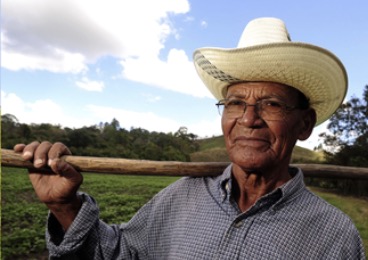Posted by Francisco Martin, Islamic Culture Foundation
December 02, 2013
![]()
A still from the movie Las Voces del Agua (Spanish)
Men and women in Islam have made full use of every drop of fresh water, egged on by the scarcity of water resources and supported by a quasi-mystical consciousness of its transformative power to shape landscape, and its capacity to revitalise the soul from a spiritual point of view. Today, as we see how the agricultural world has been almost completely industrialised, water is also a knowledge that begins to vanish from our memory. In the context of rural depopulation, the young generations grown in an urban environment are unaware of the traditional water management, and thereby we run the risk of losing thousands of years of traditional knowledge.
These insights were the point of departure for the project ‘Wise Voices’, run by the Islamic Culture Foundation in Spain, a non-profit organisation which has strived since 1982 to facilitate dialogue between Europe and the Arab-Muslim countries.
The great cultural blossoming during the al-Andalus period was made possible, among other reasons, through a wise water management. In this way, the testimony of the last farmers in Spanish regions with a strong tradition of Andalusian irrigation is a collection of voices that still know the secrets of water use. The project ‘Wise Voices’ travelled to three regions in southern Spain (while it is true that the Andalusian cultural legacy lives on in other parts of the country) with the challenge of studying, knowing, inventorying, conserving and maintaining those voices. These regions are Ricote Valley in Murcia, Axarquía in Málaga, and Alpujarras in Granada and Almería. The waters in these regions flow through ‘acequias’ (ditches) ‘aljibes’ (tanks) or ‘azudes’ (dams), all these words of Arabic origin, while the farmers continue to organise the irrigation and balanced management of water on the basis of communities and councils that go back to the al-Andalus period. Such efforts resulted in a blog in Spanish with over 18 hours of taped interviews and a large number of texts that provide a context for those conversations.
 The next logical step was to create the short docu-film ‘The Voices of Water’ as a means to present the work done in a more concise format, while seeking to open up new avenues for reflection. The words of the last generation of farmers form the pages of a storybook that a mother reads with her daughter and also the images of a film screened on the walls of the city. This way, ‘The Voices of Water’ builds a bridge between the past and a present without memory, between the oral and written traditions, and between the countryside and urban areas. Is it not true that the family history of an overwhelming majority of us is rooted in rural landscapes? The issue at stake is the erosion of our biocultural memory, yet the millenary culture associated to the traditional use of water, in al-Andalus and elsewhere, is not only an important historic legacy, but also as a complementary approach to the technological developments towards finding a sustainable solution to the current water management challenges. Traditional practices in irrigation and farming often make an important contribution in terms of balance with nature and recognising the value of water.
The next logical step was to create the short docu-film ‘The Voices of Water’ as a means to present the work done in a more concise format, while seeking to open up new avenues for reflection. The words of the last generation of farmers form the pages of a storybook that a mother reads with her daughter and also the images of a film screened on the walls of the city. This way, ‘The Voices of Water’ builds a bridge between the past and a present without memory, between the oral and written traditions, and between the countryside and urban areas. Is it not true that the family history of an overwhelming majority of us is rooted in rural landscapes? The issue at stake is the erosion of our biocultural memory, yet the millenary culture associated to the traditional use of water, in al-Andalus and elsewhere, is not only an important historic legacy, but also as a complementary approach to the technological developments towards finding a sustainable solution to the current water management challenges. Traditional practices in irrigation and farming often make an important contribution in terms of balance with nature and recognising the value of water.
The Islamic Culture Foundation has implemented ‘Wise Voices’ and ‘The Voices of Water’ within the framework of its programme entitled ‘Med-O-Med, cultural landscapes of the Mediterranean and the Middle East’. This cultural and environmental programme aims at making the development of 22 countries in that region compatible with the preservation of their environment and their heritage, mainly based on Islamic culture values, while putting forward new approaches and views that take into account a local point of view. The Islamic Culture Foundation seeks to continue listening and collecting the wise voices of water management in other countries across the Mediterranean and the Middle East.
Video: Lac Voces del Agua (Spanish)
Watch the French version (Les voix de l’eau) :: Watch the Arabic version (أصوات المياه)
{jcomments on}
